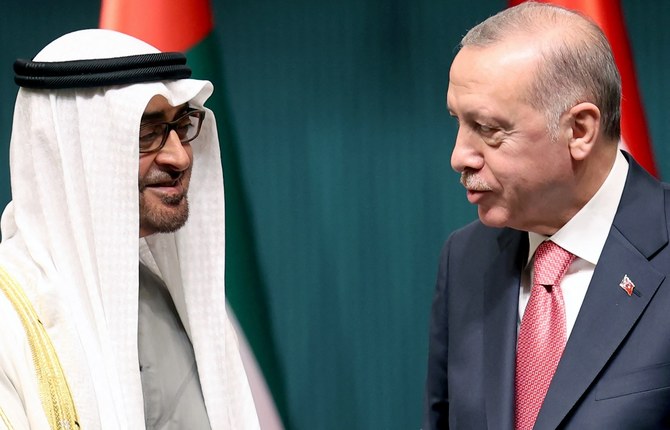
- ARAB NEWS
- 05 Jul 2025

Turkish President Recep Tayyip Erdogan has finally reached the conclusion that confrontation with the UAE does not bring him any advantage.
The roots of the tension between the two countries go back to Turkey’s strong support for the Muslim Brotherhood. When the Gulf Cooperation Council members, with the exception of Qatar, decided to oppose the extremist movement, Turkey’s relations with the UAE began to sour.
Turkey unnecessarily sided with Qatar in the conflict between Doha and the remaining GCC countries. This was a major deviation from Turkey’s traditional policy toward the Arab countries, which dates back to 1930s. Mustafa Kemal Ataturk, the founder of the Turkish republic, instructed Numan Menemencioglu, then foreign ministry undersecretary, that Turkey should strengthen its relations with the Arab countries with which it has strong cultural and social ties, but should avoid siding with some against others.
Turkey followed this policy for almost a century, and remained equidistant to all Arab countries and Israel. Thanks to this balanced policy, Turkey was able to keep open the channels of communications with both.
Turkey’s relations with the UAE worsened after Ankara claimed the UAE had financially supported the failed military coup in July, 2016
Yasar Yakıs
Arab countries consider inter-Arab conflicts a family affair and do not like non-Arab countries to interfere. They may quarrel from time to time, but eventually reconcile. This is what is happening now in the dispute between Qatar and other GCC countries.
Turkey made a similar mistake when the UAE decided to establish diplomatic ties with Israel. Ankara’s response was all the more inconsistent, because it maintained diplomatic relations with both the UAE and Israel, and opposed the establishment of diplomatic relations between two third countries.
Turkey’s relations with the UAE worsened after Ankara claimed the UAE had financially supported the failed military coup in July, 2016. Pro-government media published full-page reports claiming that the UAE transferred funds to Turkey to prepare the coup. As evidence for a UAE role, some Turkish media outlets said that it took 16 hours for the UAE to condemn the military coup and confirm support for Erdogan.
Sedat Peker, a leading figure in Turkey’s criminal underworld, became the subject of lively debate in the country’s media for months. After visiting several countries, he has decided to settle down in Dubai and has been posting videos exposing the “dirty linen” of Turkish governments, past and present. UAE authorities have apparently warned him against posting such videos.
Now Peker posts tweets that are equally detrimental to the reputation of politicians of the ruling AKP. This subject was probably not officially raised in the bilateral talks. However, we may presume that it may have been thoroughly discussed at the level of security departments of both countries. Peker’s subsequent messaging will reveal whether a bargain has been struck on this subject.
The Libyan crisis has added to tensions between Turkey and the UAE. Until recently the two were on opposite sides in this conflict. We will have to wait and see how the situation will evolve after the Ankara-Abu Dhabi thaw and the Libyan elections scheduled for Dec. 24.
Turkey is the only country that cooperates with the UN-supported Government of National Accord based in Tripoli. Despite this legitimacy, the GNA is dominated by Muslim Brotherhood-inclined MPs, while the international community, including Russia, the UAE and Egypt, is uneasy with the influence of the extremist group.
Fortunately, an agreement has been worked out under the UN auspices to organize elections that will involve as many political stake-holders as possible. The Libyan government openly invited “all foreign military forces” to withdraw from the Libyan soil. Turkey ignored this, saying that its military presence in Libya, unlike all others, stems from an invitation of the UN-backed government.
Ten cooperation agreements were signed during last week’s visit to Ankara by the UAE Crown Prince Sheikh Mohammed bin Zayed Al-Nahyan. A $10 billion fund has been put aside by the UAE for investment in Turkey, a major boost for Turkey’s crisis-ridden economy. Erdogan will be happy because Turkey is preparing for elections and the $10 billion injection will provide temporary relief from the country’s financial woes.
The UAE funds to be invested in Turkey will serve the interests of both countries. UAE companies have a reputation of investing in well-assessed projects, but their Turkish counterparts are not in a strong negotiating position.
The importance of the visit is that a new page may be turned in the relations of the friendly peoples of these two countries.